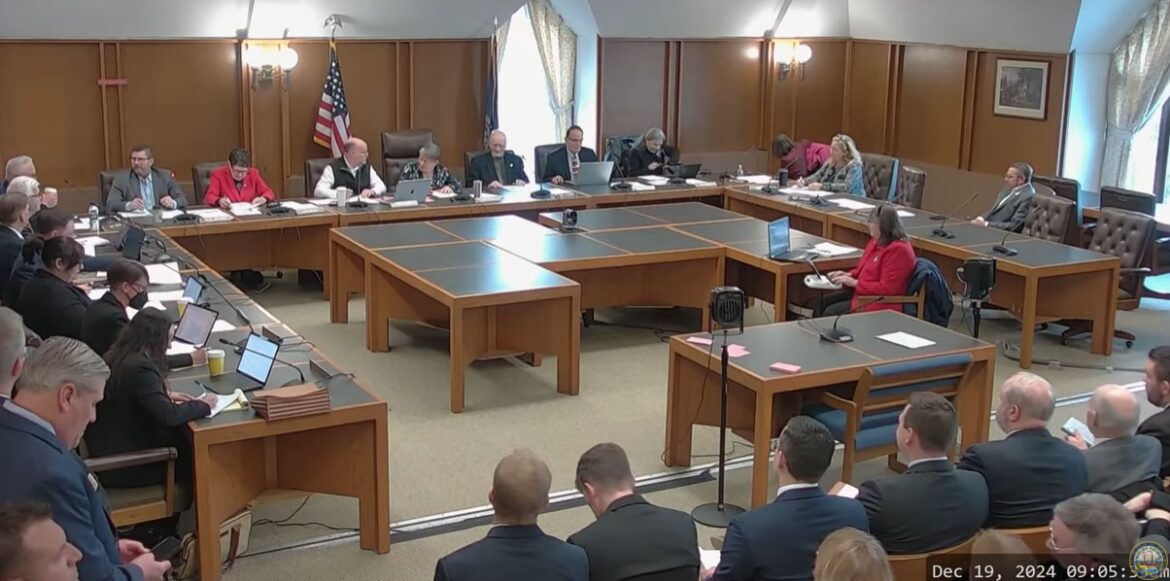By PAULA TRACY, InDepthNH.org
CONCORD – After temporarily rejecting proposed solid waste siting rules last month, a legislative committee voted 9-1 Thursday to approve them, despite public objections that they don’t go far enough in protecting the public.
Rep. Carol McGuire, R-Epsom, said there are at least three bills related to landfill sitings that will come before the legislature this winter and that is where the public policy issues should be meted out, noting that is not the job of the Joint Legislative Committee on Administrative Rules.
Committee Chair Sen. Tim Lang, R-Sanbornton, agreed.
But state Rep. Peter Schmidt, D-Dover, voted to oppose the passage of the revised rules because he felt the response from the Department of Environmental Services that these are better than existing rules is “almost disrespectful to the amount of opposition from the public” and that the real issue is “these are not protective enough.”
Particularly, opponents of siting a landfill in Dalton fewer than 200 feet from Forest Lake State Park have discussed concern that leachate from that proposed facility could migrate into water systems and the environment and the rules do not specify soil types and impacts and are more sympathetic to the industry, in this case, the proposal from Casella Waste Systems of Vermont.
The JLCAR unanimously voted last month to temporarily object to the DES’s proposal and sent it back to the department. There were no changes made.
He said the agency’s categorical defense of their response “needs to be further discussed.”
Adam Crepeau, assistant commissioner who sat with Mike Wimsatt of the DES’s solid waste management bureau, said the proposed rules are more protective than the current rules in 27 different areas and in no case are less protective. He said the department went “above and beyond” the process required for public input.
That input was voluminous and largely in opposition.
Last month, McGuire said she was hesitant to temporarily object but noted the sheer volume of input and technical nature made her support a pause for better clarification.
She noted that Casella’s landfill application could be impacted, and she did not want decisions based on old rules which are more permissive.
“And I don’t believe that is what anybody wants,” she said.
But based on Crepeau’s contention that these new rules were more restrictive, she moved to approve them.
“We need to settle it and go with this improved level of protection. They are not perfect, but most of the issues we have heard from – and we have had voluminous public testimony – appear to be based more on the policy for landfills than on the specifics of the rules. I know there are more than three bills coming in this year that address the policy of landfills and I would like to have a better baseline in our rules before we settle this issue of…any changes to the policy. Because if any of those bills pass and change the requirements the rules will have to be updated to incorporate those changes. That is my major purpose is to separate the policy discussion which is important from the rules discussion and JLCAR isn’t a policy committee. We only go by what is currently in the laws. So that is why I move to approve the rule,” McGuire said.
No public testimony was taken by the committee Thursday.
But the Env-Sw 800 decision was met with concern by The North Country Alliance for Balanced Change.
Wayne Morrison, president of the group, called it “deeply disappointing to see these rules approved and also that JLCAR would not allow the public to speak at the hearing.”
He said throughout the process, the public has tried to have their voices heard, expressing valid concerns about how these weakened standards will affect our communities and environment.
“Unfortunately, it seems these concerns were ignored in favor of industry interests,” Morrison said.
He added the revised Env-Sw 800 rules have been criticized for prioritizing the needs of industry over environmental protection. Documents and testimony have revealed that industry representatives worked closely with DES to reshape the original draft rules, ultimately resulting in the weakening of these final rules. This will likely now be the criteria used to site the state’s next completed landfill application.
“With less than 30 days until a new governor takes office, one who has vowed to stop the disastrous GSL project in Dalton, DES has pushed through weaker sitting rules and created a roadmap for approval of an ill-sited and unnecessary landfill. This is a clear failure of our regulatory process to serve the public good,” Morrison continued.
NCABC and other advocacy organizations have vowed to continue fighting for stronger landfill siting criteria and to hold decision-makers accountable for putting corporate interests ahead of public health and clean water.






